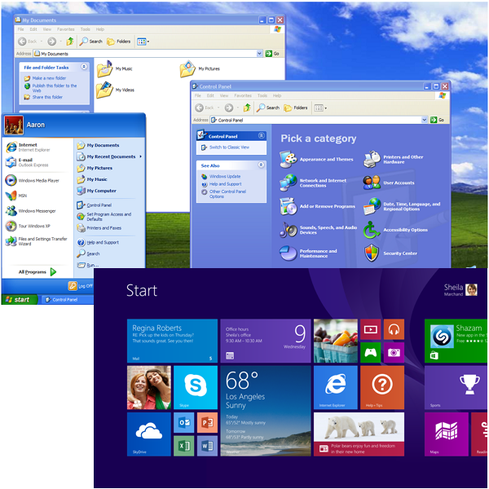Windows XP Shutdown Outrage: Users Boo Microsoft Blog
Microsoft blogger recently encouraged customers to "help their family and friends get off Windows XP." Oh, really?


Windows XP Shutdown: 10 Facts To Know
Windows XP Shutdown: 10 Facts To Know (Click image for larger view and slideshow.)
There's nothing all that remarkable about a Microsoft employee publishing a post to one of the company's corporate blogs. Redmond maintains eight separate blogs for Windows alone, not to mention similar sites for products like Windows Phone and Internet Explorer.
So you're forgiven if you missed this one from Feb. 7: Brandon LeBlanc, Microsoft's chief blogger, reminded readers that the end of support for Windows XP, which still powers 29% of the world's PCs, was then just two months away. (Support for XP ends April 7.) The post, "Help your friends and family get off Windows XP," begins: "Today marks 60 days until the end of support for Windows XP and we need your help spreading the word to ensure people are safe and secure on modern up-to-date PCs."
It seemed a harmless -- if perhaps a tad desperate -- pitch to sophisticated Windows users: Please help us get your technology laggard friends and family off XP and onto a "modern" OS, Windows 8.1.
After a fortnight in the wild, though, harmless is definitely not the right word. Rather, Windows customers have turned the comments section -- 162 posts and counting -- into a business-school case study on the downside of corporate blogging. Many of the comments express displeasure with Windows 8.x, Microsoft's sales and marketing strategies, past product flops, and other gripes.
[Users are voting by not using their feet. See Microsoft Sells 200M Win 8 Licenses: Yawn.]
Naru wrote: "Honestly, this sounds more like a sales pitch for Windows 8.1 than any kind of interest in what is actually best for my friends and family." XMVP, meanwhile, who identified himself as a former Microsoft MVP, said: "I'm having a heck of a time telling all the people I know with XP machines to move to 8.1. I don't even use it, and probably won't."
That's among the gentler blowback.
Snodrog kicked things up a notch: "I was a victim of Windows ME; my husband was a victim of Vista. Both of us are tech-savvy endusers and our computers run XP. We will not upgrade to Win 8.1, and when we can no longer use XP we will move to machines running Linux or Macs. And you can stick that up your arrogant corporate backsides."
Figure 1:  (Image: Quickmeme)
(Image: Quickmeme)
As the legendary Ron Burgundy would say: "Boy, that escalated quickly."
So where did things go wrong?
For starters, directly pairing the awareness campaign around XP's support cutoff with the push for Windows 8.1 upgrades was, at this stage, a woeful miscalculation of the marketplace. As Keatah wrote: "If Microsoft could make a compelling and user-friendly product that doesn't alienate current hardware and software AND is reasonably priced, the upgrade sales would roll in all by themselves. All without the need for MS asking us to upgrade. But instead we're stuck with this situation."
Microsoft's message makes no mention of Windows 7 -- nor, of course, the fact that Windows 9 rumors are already rampant. Right or wrong, Windows 8.x's ragged public perception doesn't make for a great XP upgrade spiel. "Hey, dump that old OS that everyone still seems to love and fork over some cash for this 'modern' OS that everyone seems to love to hate! P.S. You're probably going to need buy hardware, too." Not exactly the stuff of a memorable Super Bowl spot.
One of the odder things about the friends-and-family pitch is that it offered no incentive to spur Windows diehards into action. No discounts, no Microsoft Store credit, no nothing. Instead of taking a "scratch our back and we'll scratch yours" approach, Microsoft effectively said: "Scratch our back. It's itchy."
That's particularly puzzling given that the cost of upgrading is most definitely an obstacle for some customers. Several comment authors took issue with
Windows 8.x licensing and pricing. Others said they simply can't afford to buy a new PC. "I have an XP computer and I cannot afford to upgrade," Miss Tia wrote, adding that she likes the aged XP just fine.
InformationWeek readers have shared similar sentiments in recent months: they're not getting off XP because they don't have the money for new hardware. One reader chimed in on a recent story: "New computers aren't free. Unless MS wants to buy me a new computer, I will have to continue using XP." Among businesses still running XP, budget commonly appears on the list of reasons why.
That's one of the more awkward aspects of marketing XP-to-8.x upgrades: While XP-aged hardware might meet the minimum system requirements for Windows 8.1, it's unlikely to deliver an optimal experience. Indeed, one of two upgrade paths outlined in LeBlanc's blog post is simply: Get a new PC. "The easiest path to Windows 8.1 is with new devices and there are offers and deals from many retailers to help people get a new device," LeBlanc wrote. Translation: Please buy new stuff.
Another Windows XP user, retired, commented on Feb. 20, nearly two weeks after the post was published: "It would be really nice if you would stop telling me how to spend MY MONEY, as in 'get rid of XP and buy yourself a new computer.' ... You are going to lose a lot of [retirees] ... Do you really think we can afford a new computer on YOUR WHIM?"
To Microsoft's credit, it's allowing the overwhelmingly negative conversation to flow freely. LeBlanc assured some of the more ornery respondents that "we're not censoring your comments" and said he is passing the feedback along to "appropriate teams at Microsoft." He noted that some messages may be removed if they're flagged as inappropriate, abusive, or spam. (Imagine what some of those messages must say.)
It's reasonable to assume that the feedback hasn't been warmly received, and it's a reminder of the risks inherent in communicating at customers when they have a very public forum for responding. (Like, say, the Internet.) Even one of the strongest bullet points in Microsoft's "get off XP" message -- the potential security problems for users and networks once Microsoft stops patching software flaws -- was thrown back in the company's face.
"Yeah, I know [XP] isn't as secure as a newer OS, but most people I speak to have come to expect all Microsoft OS's to be insecure and have to be behind anti-virus, anti-malware, and a firewall anyway," XMVP wrote. He recommends that XP stalwarts stop using Internet Explorer, Outlook, and Outlook Express, and potentially even Office after April 7 if they want to take extra security precautions.
"I think Microsoft made some serious errors in the [recent] years regarding OS upgrades, and I put this firmly on the 'retiring' CEO's plate for mishandling it and not understanding the market or how people think," XMVP continued. "You can only 'milk' people for so long before they get irritated and put their foot down. Microsoft pushed this too far, and has lost their goodwill with most of the people I influence, and I don't blame them."
Engage with Oracle president Mark Hurd, NFL CIO Michelle McKenna-Doyle, General Motors CIO Randy Mott, Box founder Aaron Levie, UPMC CIO Dan Drawbaugh, GE Power CIO Jim Fowler, and other leaders of the Digital Business movement at the InformationWeek Conference and Elite 100 Awards Ceremony, to be held in conjunction with Interop in Las Vegas, March 31 to April 1, 2014. See the full agenda here.
About the Author
You May Also Like






